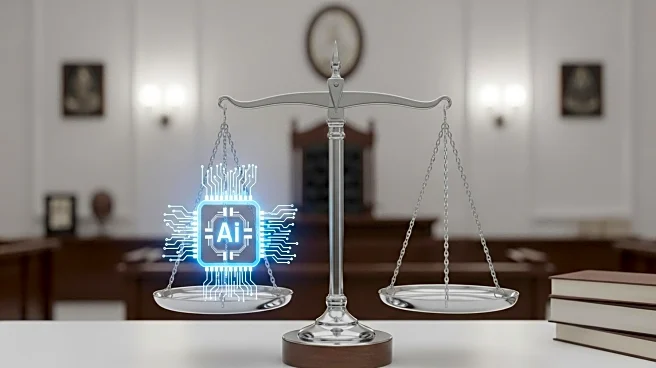What's Happening?
The increasing reliance on artificial intelligence (AI) in the legal profession is raising concerns about its impact on critical thinking and problem-solving skills among lawyers. A recent survey highlighted that while AI tools like ChatGPT can enhance efficiency, they may also lead to an overreliance on technology, inhibiting the ability of legal professionals to think critically and solve problems independently. This trend is particularly worrying for new lawyers who may miss out on essential learning experiences if AI handles most of their tasks. The legal community is grappling with the implications of AI's pervasive role, questioning whether it is making professionals too dependent on technology and less capable of performing traditional legal analysis.
Why It's Important?
The integration of AI into the legal field has significant implications for the profession's future. While AI can streamline processes and increase productivity, it also poses a risk of diminishing the critical thinking skills that are fundamental to legal practice. This shift could affect the quality of legal services and the development of new lawyers, who may not acquire the necessary skills to become competent practitioners. The potential loss of critical thinking abilities could lead to a workforce that is less adaptable and innovative, ultimately impacting the legal industry's ability to serve clients effectively. As AI continues to evolve, the legal profession must find a balance between leveraging technology and maintaining the human skills essential for legal practice.
What's Next?
The legal industry may need to reassess its approach to integrating AI, ensuring that it complements rather than replaces human expertise. Legal education and training programs might need to adapt, emphasizing the development of critical thinking and problem-solving skills alongside technological proficiency. Law firms and legal institutions could also consider implementing guidelines to ensure that AI is used responsibly, preserving the integrity of legal practice. As the conversation around AI's role in the legal field continues, stakeholders will likely explore strategies to mitigate its potential negative effects while maximizing its benefits.
Beyond the Headlines
The ethical implications of AI in the legal profession are profound, as reliance on technology could lead to ethical dilemmas regarding accountability and decision-making. The potential for AI to influence legal outcomes raises questions about fairness and justice, particularly if AI systems are not transparent or if they perpetuate biases. The legal community must address these concerns to ensure that AI enhances rather than undermines the principles of justice and equity.









